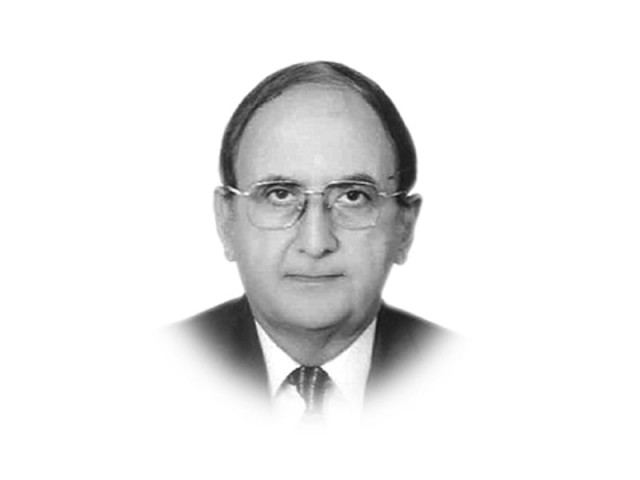Democracy and performance
In Pakistan, the military has expanded its domain of action because of the inability of the civilian leadership

The writer is an independent political and defence analyst. He is also the author of several books, monographs and articles on Pakistan and South Asian affairs
However, there is a strong deficit of quality and performance in the Pakistani democracy. The quality and substance of democracy are poor and there has been a steady decline of these qualities in democratic institutions and processes. Elected governments have shown extremely poor performance in governance; at times, it appears that the elected rulers are unable and unwilling to rule effectively and judiciously for improving the quality of life of the people. These governments are failing in delivering basic services to the people when it comes to health care, education and civic facilities. Corruption and mismanagement are the hallmarks of the administrative and bureaucratic structure.
Pakistan’s electoral democracy has degenerated into a personalised, patrimonial and an essentially corrupt political order that serves the immediate and long-term interests of the power elite, which include the top political leaders and their allies, powerful business and industrial leaders, the senior-most bureaucratic elite and the top brass of the establishment. Some benefits are allowed to trickle down to the common people so that they do not completely revolt. Political leaders want to project themselves as saviours by giving financial ‘handouts’ to people rather than seeking long-term solutions to socioeconomic problems. This is a bid to create beneficiaries and loyalists rather than citizens who function in an autonomous manner and seek accountability of rulers.
The wide gap between the abstract notion of democracy or its formal structure and the situation on the ground or what is often described as the substance and spirit of democracy, has given rise to an interesting debate in politically active circles. Should we all continue to support elected civilian leadership and the civilian processes even if their performance is poor or they engage in corruption and nepotism? If such support is not given to civilian institutions, the balance of power will shift in favour of the military. This shift has already started in Pakistan. The alternative view is that one cannot be oblivious to corruption, nepotism and deficient governance simply because an elected government is involved. The holding of periodic elections and the existence of an elected parliament and government does not give a licence to the rulers to run the country like their fiefdom. A democratic civilian government must earn ‘performance legitimacy’ to justify its continued rule. It calls for creating an administration that has the capacity to deliver certain minimum services to the common people. It must establish a relatively corruption-free, merit-oriented and rule-based administration.
The supporters of abstract democracy describe the emphasis on performance of democratic government in Pakistan as synonymous with supporting the military’s expanding role. They describe the criticism of the performance of the federal and provincial governments as an attempt to undermine democracy. The experience of countries that have undergone long years of military rule suggests that the key to success of civilian rule is the establishment of a credible civilian alternative to military rule. This objective can be achieved only through good governance, a rule-based, corruption-free, transparent administration and the provision of basic services to the people, like free or affordable health care, basic education and minimum civic facilities for decent and secure living. Only this strategy can give endurance to democratic institutions and processes.
It is no longer enough to have an elected civilian government. What is its performance? Can it win over voluntary loyalty of the people by working for the betterment of common folks across the board? Can the civilian government create socioeconomic justice and mitigate inequities in society? This is going to be a long-drawn process. However, civilian government must create confidence among the people that its policies will ensure a better future for them. If an elected government wins over the goodwill of the people on the basis of its performance and service to its citizens, the democratic process and institutions become viable and secure. Only such institutions and processes command the state and society.
In Pakistan, the military has expanded its domain of action because of the inability of the civilian leadership to command the management of internal security, especially when it comes to the eradication of terrorism and dealing with external security threats. As the performance of civilian governments has been poor in terms of their obligations to the citizenry, Nawaz Sharif has found it convenient to give space to the military in policymaking and policy enforcement in security, foreign affairs and internal security and administration. The current phase of the war on terror was initiated by the military and it has continued to manage it. The civilian leadership went along with this. Nawaz Sharif may have learnt the art of political survival by aligning with the military, but his position will weaken if his government does not improve its performance and create political accommodation with major opposition parties.
Is the current democratic political order in Pakistan under any threat? The answer is yes. The threat comes not only from an active military, but also from faltering civilian leadership, which is engaged in bitter mutual fights with the elected governments not showing enough determination to rule judiciously and serve the citizenry. There cannot be democracy only for the sake of democracy. It must serve the people and ensure effective and fair governance.
Published in The Express Tribune, June 29th, 2015.
Like Opinion & Editorial on Facebook, follow @ETOpEd on Twitter to receive all updates on all our daily pieces.














COMMENTS
Comments are moderated and generally will be posted if they are on-topic and not abusive.
For more information, please see our Comments FAQ